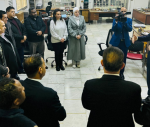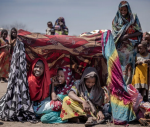You are here
World Environment Day: Jordan joins regional voices to advocate for biodiversity
By JT - Jun 06,2020 - Last updated at Jun 07,2020

The UNEP Regional Office for West Asia launched an online challenge on the occasion of World Environment Day that witnessed the participation of several NGOs and environmental initiatives in Jordan (JT file photo)
AMMAN — This year, World Environment Day, which is marked annually on June 5, has the theme of biodiversity, a concern that is “both urgent and existential”, according to a UN Environment statement.
“Recent events — from bushfires to locust infestations and now a global pandemic — demonstrate the interdependence of humans and the webs of life in which they exist. Nature is sending us a message,” the statement read.
Since 1974, the “most renowned” day for environmental action has been celebrated every year on June 5 through engaging governments, businesses, celebrities and citizens to focus their efforts on a pressing environmental issue.
“Above all, World Environment Day offers a global platform for inspiring positive change. It recognises that global change requires a global community. It pushes for individuals to think about the way they consume; for businesses to develop greener models; for farmers and manufacturers to produce more sustainably; for governments to safeguard wild spaces; for educators to inspire students to live in harmony with the Earth; and for youth to become fierce gatekeepers of a green future. It requires all of us,” the statement said.
In light of the limitations presented by the COVID-19 pandemic, the United Nations Environment Programme (UNEP) Regional Office for West Asia took its celebrations to the virtual space this year.
The office conducted a series of live discussions on social media to inform audiences of practical behavioral changes which people could adopt to lead sustainable lifestyles, manage waste in an environmentally friendly manner, transform their relationship with the natural world, adopt nature-based solutions to preserve biodiversity, the relationship between nature and climate change and the relationship between people and nature.
These live discussions hosted different partners from inside and outside of the region including the Acting Executive Secretary of the Convention on Biological Diversity, the Environment Public Authority of Kuwait and the International Union for Conservation of Nature, according to the statement.
The regional office also launched an online challenge which called the people of the region to action by pledging their commitment to standing #ForNature, which received an “overwhelming response from Jordan”.
HRH Princess Basma, Honorary Human Development Ambassador of the UNDP, joined the challenge by posting a video and added her voice to the voices of millions of people to protect the planet, the statement noted.
Minister of Environment and Agriculture Saleh Kharabsheh also joined the challenge by pledging commitment to nature through a video. The challenge further witnessed the participation of several NGOs and environmental initiatives in Jordan that joined forces to amplify the World Environment Day message.
“Biodiversity contributes directly to human well-being and development priorities. It is at the centre of many economic activities, particularly those related to food and other commodities. Globally, nearly half of the human population is directly dependent on natural resources for its livelihood, and many of the most vulnerable people depend directly on biodiversity to fulfil their daily subsistence needs,” said Regional Director and Representative of UNEP for West Asia Sami Dimassi.
“Biodiversity is also critical to achieving the Sustainable Development Goals [SDGs] outlined in the 2030 Agenda for Sustainable Development. Biodiversity and ecosystems feature prominently across many of the SDGs and associated targets,” he added in the statement.
Dimassi also highlighted the impact of COVID-19 on the environment: “COVID-19 has revealed the vulnerability of global systems to protect the environment, health and economy. There is an increasing recognition of how multiple economic, social and institutional drivers exacerbate environment risks, impacting on human health and increasing the burden on health services.”
“Fundamental to a transformational and green recovery will be early action on a longer-term agenda to address climate change, avoid habitat loss and fragmentation, reverse the loss of biodiversity, reduce pollution and improve waste management and infrastructure,” he said.
In Jordan, UNEP in collaboration with the International Union for Conservation of Nature (IUCN) and national partners, has led the implementation of the Healthy Ecosystems for Rangeland Development project (HERD).
HERD is a four-year initiative funded by the Global Environment Facility bringing international experience and scientific expertise in ecosystem restoration to scale up proven approaches across half a million hectares in Jordan and Egypt. HERD is supporting communities to create inclusive rangeland management plans, while developing institutional capacity to ensure that these plans are integrated into policy and backed by wider legislation, the statement concluded.
Related Articles
AMMAN — HRH Princess Basma Bint Talal, chairperson of the Jordanian Hashemite Fund for Human Development (JOHUD), on Monday attended a signi
AMMAN — As the COVID-19 pandemic continues to have a devastating impact on the economy and social well-being of the people in the Arab regio
AMMAN — The World Future Council (WFC) has awarded Jordan the bronze Future Policy Award 2017 for its Updated Rangeland Strategy that enshri


















